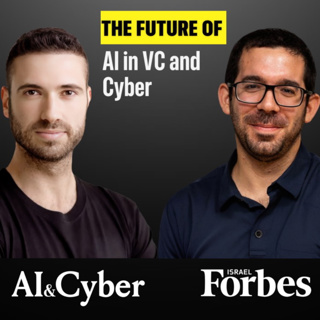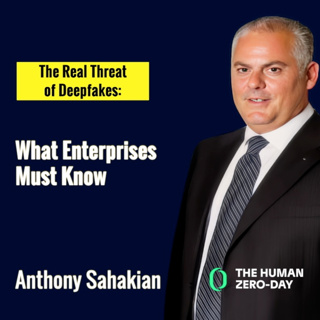
The Human Zero Day Series | Ep1146: The Real Threat of Deepfakes - Anthony Sahakian on What Enterprises Must Know
Anthony Sahakian’s journey into deepfake detection began before the world even had a name for it. From navigating misinformation in authoritarian regimes to pioneering AI-driven solutions for enterprises, he shares hard-earned lessons on the limits of technology, the power of cognitive bias, and why the fight against digital deception starts with human awareness.
6 Jul 26min
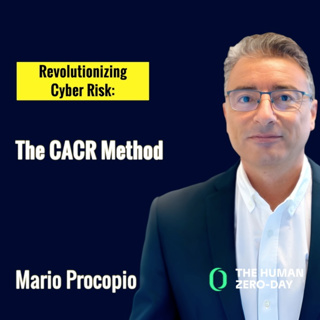
The Human Zero Day Series | Ep1147: Revolutionizing Cyber Risk: The CACR Method with Mario Procopio
Cyber threats evolve constantly, but most organizations still rely on static, outdated risk assessments that leave them vulnerable. Mario Procopio challenges this mindset with CACR—Continuous Assessment, Continuous Remediation—a methodology inspired by agile DevOps principles that enables real-time risk visibility, adaptive security strategies, and faster decision-making. He breaks down how CISOs can shift from reactive defenses to proactive, dynamic risk management, ensuring security evolves as fast as the business.
5 Jul 35min
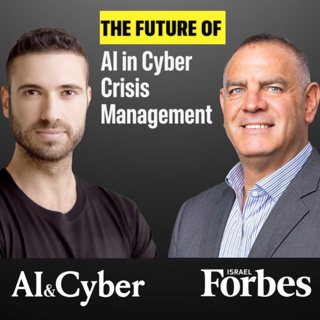
AI-Powered Crisis Management: Transforming Cybersecurity Responses with Nimrod Kozlovski
Cybersecurity breaches are unavoidable, making resilience and effective response critical for businesses. My conversation with Nimrod Kozlovski, co-founder of Cytactic, highlighted how AI can transform crisis management.Kozlovski, an expert in guiding Fortune 500 companies through cyber incidents, observed significant chaos during crises despite numerous external advisors. He noted that relying on various experts, each with their own processes, often creates confusion when clarity is most needed. This fragmented, manual approach exacerbates damages; Kozlovski points out that most cyber incident damages stem from the chaotic response rather than the initial attack. Many companies shut down unnecessarily or operate unaware of ongoing risks, leading to substantial reputational, legal, and financial harm.The core issue, Kozlovski believes, is a lack of technological support in crisis management. While other business functions have embraced digital transformation, cyber crisis management often relies on outdated, static playbooks.AI offers a powerful solution. AI tools, like those from Cytactic, can simulate potential crises tailored to an organization's vulnerabilities. Kozlovski emphasized that AI excels at dynamically adjusting crisis response processes in real time, unlike static traditional playbooks.AI also streamlines communication and task prioritization by synthesizing complex data into actionable insights for faster decision-making and clearer communication. Kozlovski highlighted Israeli startups, including Cytactic, that use AI to automate threat detection and response, immediately initiating targeted actions upon anomaly detection. This significantly reduces incident severity and duration by bridging the gap between detection and response, minimizing human error.It's clear that organizations must prioritize resilience and real-time responsiveness, with AI dramatically enhancing crisis preparation. Embracing these advanced solutions will lead to fewer disruptions, quicker recoveries, and more robust business continuity. As Kozlovski stated, "AI’s role is enormous... It enhances human capabilities dramatically, offering clarity, confidence, and consistency precisely when human teams need them most."The future of cybersecurity crisis management lies in intelligently managing inevitable attacks. Organizations must integrate AI-driven solutions to transform their security frameworks from reactive chaos to proactive, data-driven resilience.
2 Jul 35min

Ep1145 | Alan Cahn: Design Your Next Era
At 64, Alan Cahn reframed his life with a purpose: to help people live with full hearts and enlightened minds. From a challenging childhood and early countercultural days to 32 years designing transformative experiences at Landmark, Alan’s path is grounded in deep personal work. In this episode, he reflects on the power of presence, the myth of being “stuck,” and the quiet discipline behind real change. Through stories of mentorship, mistakes, and micro-decisions, he shows how anyone—at any age—can live a life aligned with purpose.
27 Jun 1h 6min

Ep1144: Yossi Matias: Scaling AI for Impact
What happens when cutting-edge AI research meets real-world urgency? Yossi Matias reflects on decades at the forefront of innovation—from early machine learning to deploying life-saving healthcare tools and advancing AI agents that accelerate scientific discovery. Through stories of rapid transformation, he reveals how research, curiosity, and responsibility converge to shape technology with global impact.#AIInnovation #TechForGood #MachineLearning
10 Jun 22min
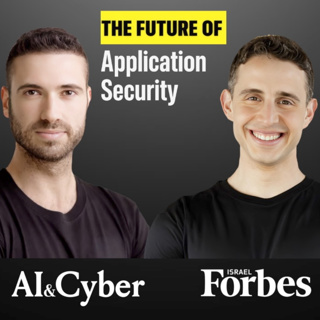
Securing the AI-Driven World: A Conversation with Daniel Shechter, CEO of Miggo Security
Cybersecurity is no longer just about preventing breaches—it’s now about enabling innovation securely in a fast-moving, AI-powered world. As artificial intelligence becomes embedded in everything from microservices to digital platforms, cybersecurity needs a major mindset shift. Daniel Shechter, CEO of Miggo Security, cybersecurity leader at 8200, and Havazalot program alumni, offers exactly that.Daniel’s journey—from jazz saxophonist to military intelligence, McKinsey consultant, and now startup founder—reflects a rare ability to simplify complex challenges. It’s a skill that’s more vital than ever as AI and cybersecurity rapidly converge.In our conversation, Daniel spotlighted a critical but often overlooked domain: application-layer security. Traditionally, app security focused on static code scans or endpoint defenses. But today’s systems run on microservices, rendering those approaches outdated. As Daniel explained, “Endpoints are losing many functionalities over time, shifting largely to SaaS in the backend. That’s what we protect.”This shift demands a new approach—one built on observability and real-time application detection and response. He compared today’s digital platforms to intricate water networks where threats can flow undetected. To keep up, security can’t just be reactive—it must be deeply integrated and proactive.The need for speed has never been clearer. Daniel cited eye-opening stats: AWS’s CISO reported that attacks tripled or quadrupled with the rise of generative AI. Even more alarming, attackers can now exploit known vulnerabilities in as little as 22 minutes—down from 100 days just a few years ago.For Daniel and Miggo Security, the mission is clear: secure innovation. “We’re here to facilitate innovation securely, responding dynamically as threats evolve,” he shared. In other words, cybersecurity can no longer be a barrier to progress—it must be the enabler.AI’s role in cybersecurity, especially at the app layer, calls for adaptive strategies that evolve as fast as threats do. Daniel’s approach—deep tracing, observability, and real-time response—embodies this necessary evolution.This conversation left me convinced: cybersecurity is entering a transformative era. Legacy tools and static defenses simply won’t cut it. Organizations must adopt agile, AI-driven solutions to protect and empower their growth.To stay ahead, companies need to prioritize flexibility and speed. In this new landscape, success belongs to those who can adapt faster than threats evolve.The message is clear: embrace AI-driven, adaptive cybersecurity—or risk falling behind.
26 Mai 45min
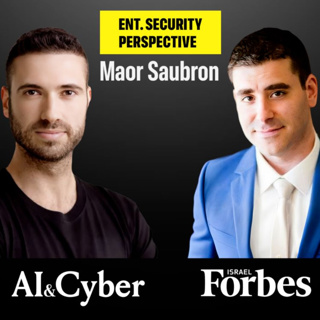
"AI Creates New Threats, but Also Unlocks Solutions We Never Had Before.", a Talk With Maor Saubron
In a world where cybersecurity threats evolve faster than our defenses, AI-driven risks are becoming the frontline challenge for enterprises. To gain deeper insights into this rapidly shifting landscape, I spoke with Maor Saubron, Head of Corporate Security at Amdocs, whose decades-long journey through cybersecurity offers an unparalleled view into how organizations can effectively respond to emerging threats.Maor leads a team of over 200 security professionals at Amdocs, a global technology giant serving critical infrastructure for telecom companies like AT&T and T-Mobile. His role places him at the intersection of security innovation and practical implementation, uniquely qualifying him to discuss AI’s growing impact on cybersecurity strategies."We are in a technological race against our attackers," Maor emphasized during our conversation. "AI is significantly reshaping the landscape by not just creating advanced threats but also by providing revolutionary solutions."One key insight from Maor was the dual nature of AI—it is both an enabler of sophisticated cyber threats and a powerful tool for defense. At Amdocs, Maor described facing enormous cybersecurity challenges due to the vast scale of their operations: hundreds of thousands of servers globally, over tens of thousands of endpoints, and approximately 30,000 employees in 90 countries. With this scale, managing the risk is both complex and critical."We receive tens of millions of emails per month, and a significant portion of these are spam or phishing," Maor revealed. The sheer volume demonstrates why traditional cybersecurity methods are inadequate. To tackle such massive challenges, Maor’s team deploys multiple layers of protection and leverages AI-powered tools to analyze patterns and reduce response times dramatically.However, despite the advanced technological frameworks, Maor pointed out a pivotal vulnerability that technology alone can't solve—the human factor. "At the end of the day, cybersecurity incidents often start with a single employee," he noted. "Our mission is to foster a deep security culture among employees, making them part of our defense strategy."This cultural shift includes comprehensive awareness programs, highly sophisticated phishing simulations, and personalized training that empower employees to recognize and respond effectively to threats. Maor believes cybersecurity must transcend technical solutions, incorporating an organization's entire human element into a holistic security strategy.When we discussed emerging threats, Maor highlighted how generative AI tools like ChatGPT have introduced new risks, especially around data leakage. Employees frequently use these tools, unintentionally exposing sensitive corporate information. Amdocs responded proactively by establishing an AI governance committee, implementing sophisticated monitoring tools, and introducing educational initiatives about responsible AI use. Maor explained, "We give employees freedom but maintain control through intelligent, automated oversight."I found Maor's approach insightful and reflective of an essential evolution in cybersecurity thinking: the integration of technological innovation with strategic human-centric policies. As organizations continue to navigate this complex environment, understanding and proactively managing both AI-driven threats and human vulnerabilities will define future cybersecurity successes.Reflecting on my conversation with Maor, it's clear that successful cybersecurity strategies must prioritize adaptability and human engagement. Companies that empower their teams through awareness, training, and AI-driven support will build resilient defenses capable of handling tomorrow's threats.The path forward requires a thoughtful blend of AI technology and a deep investment in human-centric cybersecurity cultures. This balanced approach, championed by security leaders like Maor, is not just beneficial—it is imperative.
26 Mai 36min
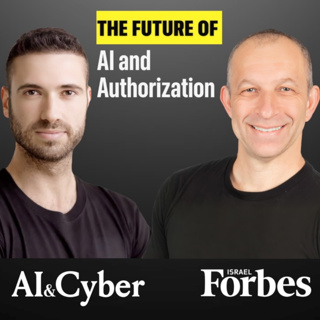
Passwordless Security in the Age of AI: A Conversation with Slavik Markovich, CEO of Descope
Cybersecurity is once again at a critical crossroads—this time, driven by the explosive growth of AI technologies. During a recent visit to Descope’s Palo Alto office, I sat down with CEO Slavik Markovich, a veteran in the cybersecurity space whose past ventures, Demisto (acquired by Palo Alto Networks) and Sentrigo (acquired by McAfee), shaped much of the modern security landscape. Our conversation centered around how AI is radically reshaping digital identity.Slavik and his team—collaborators for nearly three decades—launched Descope with a bold mission: eliminate passwords altogether. “Passwords are the worst of both worlds,” he noted, “hard for humans to remember and easy for computers to crack.” As AI supercharges phishing and other attack vectors, traditional passwords only grow more inadequate.Instead, Slavik advocates for passkeys—phishing-resistant, cryptographic keys stored locally and authenticated via biometrics, without ever exposing the biometric data. It's a fundamentally more secure and seamless approach to authentication.Descope’s innovation doesn’t stop there. As AI evolves into “agentic” form—digital agents acting on behalf of users—the company is tackling a new security frontier. These agents don’t fit neatly into existing models of user authentication or machine-to-machine trust. “The industry is shifting toward agentic AI,” Slavik explained, “and that’s expanding the scale and complexity of identity management.”One surprisingly common challenge they’re solving is the "confused agent problem," where digital agents unintentionally act with higher privileges than intended. Descope positions itself as the intermediary—managing progressive authorization, mediating between users, agents, and applications, and ensuring secure, compliant interactions.For CISOs and enterprise leaders, this shift presents both urgency and opportunity. AI is no longer an emerging edge case—it’s embedded in tools and workflows across organizations. Security teams must act swiftly to secure agent-driven interactions and identity touchpoints or risk falling behind.At Clarity, where I focus on AI-powered threats like deepfakes and next-gen phishing, I see firsthand how vital identity management has become. It’s no longer just a login issue—it’s the first and most critical line of defense. Security solutions must be both robust and frictionless, balancing user experience with airtight protection.Slavik also shared a personal insight that stood out to me: “We prioritize having fun. We’ve built multiple companies together because we genuinely enjoy the journey.” That mindset resonates. The best cybersecurity innovations come from passionate teams that love solving hard problems, not just building defenses.The identity revolution is already underway. Organizations that embrace passwordless, agent-aware authentication now will dramatically improve both their security and user experience. Those that delay will face rising vulnerabilities and growing user frustration.Our industry isn’t just evolving—it’s undergoing a full-scale transformation. Proactively embracing agentic AI, passkeys, and adaptive identity strategies is not just smart—it’s essential. Those who lead will define the future of digital trust. Those who don’t may find themselves struggling to catch up in a threat landscape redefined by AI.
23 Mai 26min
